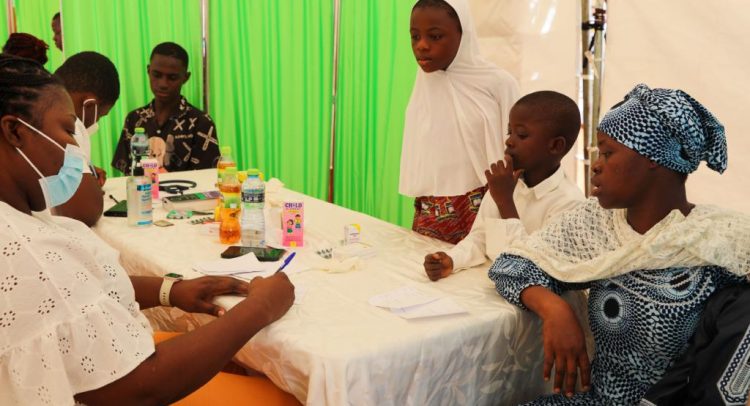Some of the residents going through the medical screening
About 1,132 residents of Ashaiman and Asawase in the Greater Accra and Ashanti regions have benefited from a free medical screening.
The beneficiaries underwent screening for malaria, blood pressure, diabetes or breast cancer conducted by a team of doctors, nurses, and lab technicians and were given medication by pharmacists.
People were also enrolled onto the National Health Insurance Scheme afresh or renewed for those with expired cards to enable them access to medical care.
The screening was one of many activities under the project “COVID 19: Comprehensive Pandemic Management for Employees, Families and Communities” funded through the GIZ-implemented develoPPP programme on behalf of the German Ministry of Economic Cooperation and Development (BMZ).
The project is aiming to strengthen the Ghanaian Health system by supporting government in accessing real time data delivered by systems such as the “Surveillance, Outbreak Response Management and Analysis System (SORMAS).
Physician Assistant at 37 Military Hospital, Jacqueline Awenjaab, said a lot of people in Ashiaman are living with high blood pressure and diabetes.
“There was an elderly man above 70 years with high sugar level of almost 30 mili moles that we needed to immediately bring under control. The range should be between 3 and 6mol” she said.
At Asawase, the doctors observed known hypertensives who had stopped taking their medications for at least two years or switched to herbal treatment.
General Surgeon with Millennium City Hospital, Dr. Frederick Agey-Jesus, said, “we also have patients who have had multiple strokes because they were not taking their medication. We have referred some of them to the nearest facility for further treatment and hope they survive. We also have examined four patients with thyroid swelling that must be managed at the regional or national level.”
Head of the Medical Team, Dr. Brainerd Anani, revealed, “This screening is important. It’s not like people here don’t know how to get to the hospital. But they do not have money to go. Even if they go and are given prescription, they cannot buy. That is why for such screening, it is prudent to make basic medications available”.
By Jamila Akweley Okertchiri

